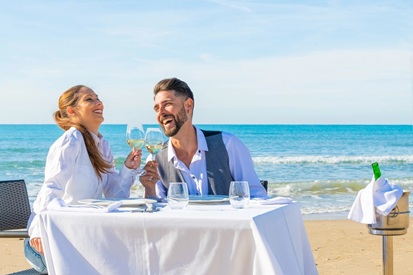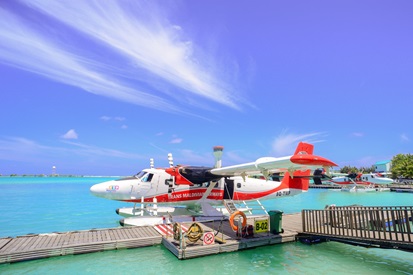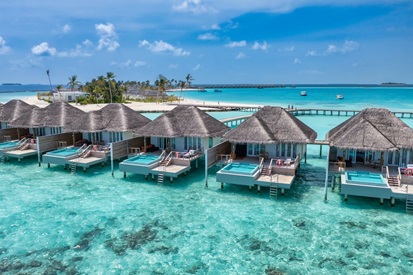

The Maldives are more than just turquoise lagoons and luxurious overwater villas. Behind the beautiful tropical views lies a deep, multi-layered culture, shaped over centuries by ancient sailors, traders, and settlers. Echoes of South Asia, the Arab world, and Africa are intertwined here, creating a unique flavor that comes to life in every corner of the archipelago. To immerse yourself in it means to truly understand the Maldives, to feel its living rhythm, far from the usual tourist cliches.

Depositphotos
Maldivian History and Culture
The history of the Maldives dates back over 2,000 years. The first settlers, who came from what is now Sri Lanka and India, were originally Buddhists. Archaeological finds such as Buddhist stupas still bear witness to this period. In the 5th-7th centuries, Arab and Persian traders arrived on the islands. From the 12th century, the archipelago adopted Islam under the influence of Arab merchants and scholars. This transition was a turning point that forever changed the cultural and social makeup of the islands. The Maldives' strategic location on the maritime trade routes of the Indian Ocean made it an important crossroads, which facilitated a constant influx of various cultural influences. Interestingly, the Maldivian cowrie shell was a widely used ancient currency for a long time.
In 1640, the Dutch landed on the islands, and were later replaced by the British, who included the Maldives in their list of colonies. In 1965, the Maldives gained independence from the British protectorate, and this day is celebrated as a national holiday on July 26.

Depositphotos
Religion of Maldives
Today, the state religion of the Maldives is Islam. This is of great importance in understanding local customs and etiquette, especially if you plan to go beyond your resort.
- Dress code outside the resort. On local islands, it is extremely important to show respect for local traditions. This means that both men and women should cover their shoulders and knees. Swimsuits and short shorts are only appropriate on the territory of resorts or on specially designated bikini beaches. Nudity (nudism) is strictly prohibited throughout the country and is punishable by fines.
- Rules of conduct. Public displays of affection, such as kissing and hugging, are not accepted in local communities. Aggressive behavior or loud arguments should also be avoided. Always ask permission before photographing locals, especially women.
- Food and Drink. Alcohol and pork are strictly prohibited on local islands, including the capital Malé. These products are only available on resort islands with a special license. Vaping is also banned from 2024.
- Prayer and Ramadan. The daily call to prayer is an integral part of life. If you are traveling during the holy month of Ramadan, be especially aware that many local cafes and shops may be closed during the day, and eating and drinking in public places is discouraged until after sunset. This is a time for reflection and fasting, and loud music or parties on local islands may not be appropriate during this period.

Depositphotos
Language
The official language of the Maldives is Dhivehi, a unique Indo-Aryan language with 4 distinct dialects. Its name is rooted in Sanskrit, but over the centuries it has absorbed elements of Arabic, Sinhalese, Hindi, Persian, Portuguese, and English. The Dhivehi script, Thaana, is read from right to left, like Arabic. There is a holiday in the Maldives called Dhivehi Language Day, which is celebrated on April 14, the birthday of the writer and scholar Hussain Salahuddin.
Knowing a few basic expressions in Dhivehi can greatly improve your experience communicating with locals. Learn useful phrases in our special phrasebook for tourists.

Asad Photo Maldives
Arts and Crafts
The Maldives boasts a rich heritage of arts and crafts based on the maritime culture and the natural resources available. These crafts not only served practical purposes, but also told stories about life on the islands:
- Lacquered woodwork is one of the most distinctive Maldivian crafts. Craftsmen create intricate designs on wooden objects such as vases, boxes, and dishes by coating them with lacquer.
- Weaving mats from dried reeds. This traditional craft is passed down from generation to generation, mainly among women.
- Dhoni Construction: Traditional Maldivian dhoni boats are handcrafted masterpieces. These boats are made from coconut wood. The boats are an integral part of the Maldivian heritage and are used for both fishing and transportation.
- Other crafts: Making jewelry, weaving ropes from coconut fiber, working with shells, calligraphy.

Depositphotos
Dance to Bodu Beru
Music and dance are central to Maldivian culture. The most famous and popular traditional form of music is Bodu Beru (literally meaning "Big Drums"). It is believed that this music was brought to the islands by sailors around the 11th century.
A Bodu Beru performance usually involves 15-20 people, including drummers, singers, and dancers. It begins with a slow, measured rhythm, which gradually increases in speed and intensity, turning into an energetic and wild dance. It is a fascinating spectacle, full of energy and passion, which is often performed at festivals and celebrations.

Angsana Velavaru Resort Maldives
Maldivian Cuisine
Maldivian cuisine is a delicious mix of flavors, heavily influenced by Indian, Sri Lankan, and Arabic culinary traditions. It is no surprise that the basis of most dishes is fresh fish and coconut - the main gifts of the generous ocean and fertile land.
Among the main products: tuna, coconut, bananas, rice, curry, various seafood. If you are staying on the local islands, be sure to visit one of the inexpensive cafes or snack bars for locals - this is a great opportunity to "try" the islands.

Depositphotos
Social Etiquette
The Maldivians are known for their warmth and hospitality. You may be greeted by drum music at the dock, and the resort staff will know your name from the first minute. This is not just a service - it is a way of life.
- Greetings. The traditional greeting is "Assalam alaykum" ("Peace be with you"). Men usually shake hands. Women generally avoid physical contact with strangers, and it is better to wait for them to extend their hand. A simple nod or a slight bow is always appropriate.
- When visiting. If you are invited into a local home, be sure to take off your shoes before entering.
- At the table. It is customary to eat food with the right hand, as the left is considered unclean. At the table, wait until all guests are seated before you begin to eat. It is polite not to refuse food and to try everything that is offered to you.
- Respect for elders. Elders are shown great respect, so it is not customary to sit cross-legged in front of them.
- Body language. Avoid making sudden gestures, stepping over people, or pointing your feet at people, food, or holy books.

Asad Photo Maldives
Maldives Holidays
In the Maldives, holidays are more than just dates on the calendar, they are a living embodiment of deep Islamic traditions and rich local culture. Whether it is the national celebrations of Bodhu Eid or Independence Day, these days are filled with a special atmosphere: the streets come alive with music, dancing, and sometimes shared meals. To attend one of them is to witness genuine joy and community unity, which will allow you to see the Maldives from a completely different side.
When planning a trip, it is worth studying the calendar to witness the vibrant Maldivian holidays.

Asad Photo Maldives
More articles
- Mauritius in Winter: Weather and Top Attractions
- Samosir Island in Sumatra: All About Vacationing
- The Maluku Islands in Indonesia: All About Vacations
- 10 Unique Facts About Indonesia
- Karimunjawa Island and National Park in Indonesia
- Indonesia's Natural Attractions: 13 Places Worth Seeing
- Nusa Dua in Bali: The Best Hotels and What to Visit
- Comment organiser un voyage aux Seychelles : 5 points clés
- Mentawai in Indonesia: All about the islands, how to get there, where to stay, and entertainment
- How much does a holiday in Mauritius cost – accommodation, food, and entertainment?



